“If you give, you will get, and if you get, you should give.” They’re words Ken Pollack lived by for 57 years, and they continue to resonate with his loved ones as they keep his legacy alive. The Arizona-based restaurateur passed away from pancreatic cancer in late 2022, but not before furthering research efforts, generating financial support and otherwise becoming a major heavy hitter in the fight against the disease.
Ken, a husband, father and the owner of eight successful Babbo Italian eateries across the Phoenix, Arizona metro area, received a Stage 4 pancreatic cancer diagnosis in February 2021. He’d spent years seeking answers about a series of vague symptoms he’d been experiencing, which included gastrointestinal issues with no obvious cause.
Ken wasn’t a smoker and was a very light drinker, having maybe a few drinks a year, total. He’d also had numerous tests and scans to check for ulcers, gallbladder issues, food allergies and gluten intolerance, but none of the tests or scans revealed anything concerning, either. Doctors had recommended Ken try Prilosec OTC, a heartburn relief medication, among other potential remedies, but none helped, and his symptoms progressed.
By the height of the COVID-19 lockdown in 2020, Ken had also begun experiencing pain in his back and right shoulder. A scan of his back raised more questions, prompting doctors to perform a full-body scan. The full-body scan revealed a mass on his pancreas, leading to a diagnosis of stage 4 pancreatic cancer and a prognosis of between three and six months to live.
Ken, his wife, Charlotte, and their children, Taylor, Josh, Ryan and Brandon, weren’t about to put too much stock in that prognosis, and the family decided to get Ken in front of a different care team. Ken and Charlotte met with Dr. Erkut Borazanci, MD, an oncologist specializing in pancreatic cancer, and Gayle Jameson, MSN, ACNP-BC, AOCN, a nurse practitioner and clinical investigator, at HonorHealth in Scottsdale, Arizona.
“No one said this wasn’t a dire diagnosis,” Charlotte said of the meeting. “But they also weren’t ‘doom and gloom’ about it and said they had a lot of tools at their disposal.”
Some of those tools involved clinical trials, which give people with pancreatic or other cancers a chance to do two important things. First, they grant patients access to new, innovative treatment methods that have not yet become available to the general public. . Second, they give patients an opportunity to participate in groundbreaking medical research that seeks to improve outcomes and advance the quality-of-care other cancer patients will receive in the future.
“Clinical trials were very important to Ken,” Charlotte said, of his decision to participate in two of them. “They gave him an opportunity to not only benefit his own journey, but those of other people, too.”
The first clinical trial Ken participated in took place at HonorHealth and involved taking three forms of chemotherapy: gemcitabine, cisplatin and abraxane. A different well-known cancer center conducted the second clinical trial, which Ken found out he was eligible tests revealing he had the FGFR2 protein, a gene mutation his family suspects may have been the driver of his cancer.
The Phase 1 trial, which involved a small number of patients, worked well initially, but it eventually became too much for Ken’s body to tolerate. Ken’s condition progressed quickly after that, and he passed away at home, surrounded by his loved ones, December 28, 2022.
Ken’s passing came almost two years after his diagnosis, meaning he’d long outlived his initial three-to-six-month prognosis – something his family attributes in part to his decision to participate in clinical trials.
“The clinical trials kept Ken with us longer than we thought,” Charlotte said. “And for that, we’re very grateful.”
Charlotte also noted that, while the family obviously wishes Ken never received a pancreatic cancer diagnosis at all, they’re relieved it happened in the past few years, and not five or 10 years ago, when there were even fewer treatment options available to patients.
A Home Run for Pancreatic Cancer Research
Baseball had long been in Ken’s blood, with a 12-year-old Ken earning a spot in 1976’s “The Bad News Bears” movie. A 15-year-old Ken opening up a baseball trading card shop in one of his earliest business ventures. Ken’s entrepreneurial pursuits continued with the 2002 opening of Arizona’s first Babbo Italian eatery (the name means “Daddy” in Italian), and his family, which continues to own and operate eight Babbo eateries today, has since turned Ken’s love of baseball into a way to raise money for pancreatic cancer research – and a way to honor his memory.
Ken had long been altruistic, hosting annual “Days of Giving” at Babbo and then donating the proceeds raised to different causes. Last year’s Day of Giving event, held in April, benefited the Seena Magowitz Foundation, with Ken and his family agreeing to match donations made throughout that day dollar-for-dollar. The event earned $105,000 for pancreatic cancer research efforts, which help advance and expand patient access to clinical trials.
After Ken’s passing late last year, his friends and loved ones decided to give upcoming pancreatic cancer fundraising events a baseball theme, leading to the creation of “Baseball for Babbo,” a fundraiser and raffle featuring baseballs and other memorabilia signed by some of the sport’s biggest stars. The first Baseball for Babbo event, held June 15, 2023, generated $153,868 for pancreatic cancer research, with Ken’s family and Roger Magowitz, the Seena Magowitz Foundation founder and president, each matching donations made up to $50,000 apiece.
“Our restaurants have always been an extension of our personal family,” Charlotte said, noting that the event gave not only the Pollack family a chance to celebrate and honor Ken’s legacy, but also, the people he employed. “Our staff members loved Ken, too – we thought this was a nice way to honor him and celebrate his love of baseball. He’d be very proud of his whole team.”
Charlotte and the family hope that, in addition to helping finance clinical trials, funds raised by past and future Baseball for Babbo events help researchers figure out better detection methods that help doctors make earlier pancreatic cancer diagnoses when it is much easier to treat.
“There’s too much wasted time. We need to figure out how to catch people before they reach Stage 4,” Charlotte, a Registered Nurse, said. “Had we known to try a certain kind of test or scan, we’d have done it. But we didn’t even know to ask. Pancreatic cancer can mimic a million other things, and it never entered our minds.”
She hopes, too, that money raised will help researchers figure out more about why some people get pancreatic cancer despite having no obvious risk factors or genetic predispositions to it.
The Gift of Time
The Pollack family continues to carry on Ken’s legacy both by keeping things running at Babbo and by hosting Baseball for Babbo and other fundraising events at its eight Valley eateries. Some of the funds raised at the event will help further the research efforts of some of Ken’s own doctors, who Charlotte credits with giving her more time with her husband than his initial prognosis suggested.
“No one tells you when you get cancer that there are blessings involved…that it brings people into your life,” Charlotte said, noting that everyone from Ken’s doctors and nurse practitioners to his friends, family and work family stepped up in the time since his diagnosis.
She said, too, that while she and Ken had a very close relationship prior to his diagnosis, they became even more so in the days after, making a point not to leave anything unsaid between them. Charlotte said Ken also made connections with other people facing pancreatic cancer, too, and that he relied on those relationships for emotional support.
“I think it’s a good thing for patients to have each other,” Charlotte said. “It’s not a journey anyone needs to or should travel alone. There’s a certain rawness between patients – they can share experiences and talk about things they maybe don’t want to talk about with their families.”
Charlotte recommends that families facing their own pancreatic cancer diagnoses advocate for their loved ones and change up their care teams if they don’t feel everyone is on the same page.
“When Ken was diagnosed, they said, ‘Get your affairs in order – you have three-to-six months,” Charlotte said. “You have to take that with a grain of salt – for us, the gift of time was an amazing thing.”
That “gift of time” gave Ken a chance to see one child marry and the birth of a grandson.
“I think it’s important to note that, while Ken may have passed, he didn’t ‘lose’,” Charlotte said. “He was really the measure of a man for me. He didn’t waste a minute of his time, his talent or his relationships.”
She also said the “bonus time” she had with Ken also gave him a chance to help prepare her to take over the Babbo business – and continue his philanthropic efforts at the eatery’s eight locations.
“The business Ken started is what gave us a platform to do something like this,” Charlotte said, of the fundraising efforts at Babbo. “It’s something he wanted to do and something we’ll continue to do. If this allows us to help even one person, we really feel like that’s a win.”
PS.
As I prepared this article written by Julia Brabant for publishing, it became so vividly apparent what an amazing family the Pollack Family is. I encourage all readers to patronize babbo Italian Eateries with eight convenient locations in the Greater Phoenix and Scottsdale area. The food is amazing and your patronage will help the Pollack Family to continue their fight against pancreatic cancer in memory of Ken Pollack.
~ Tony Subia, Executive Vice President, Seena Magowitz Foundation.













































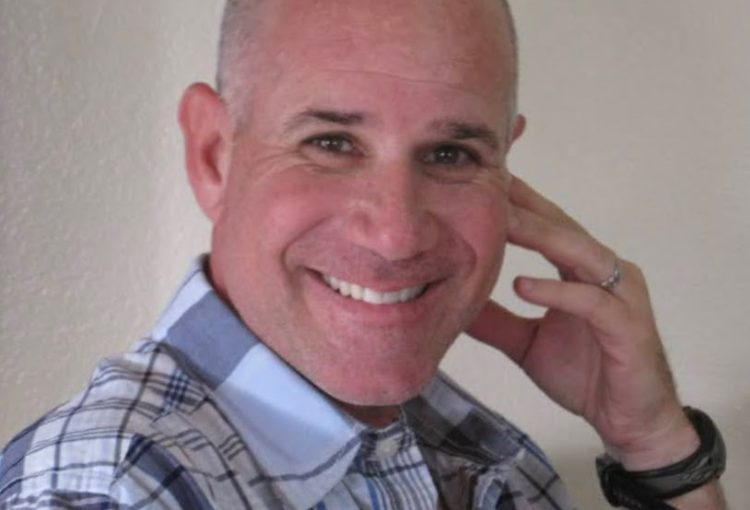
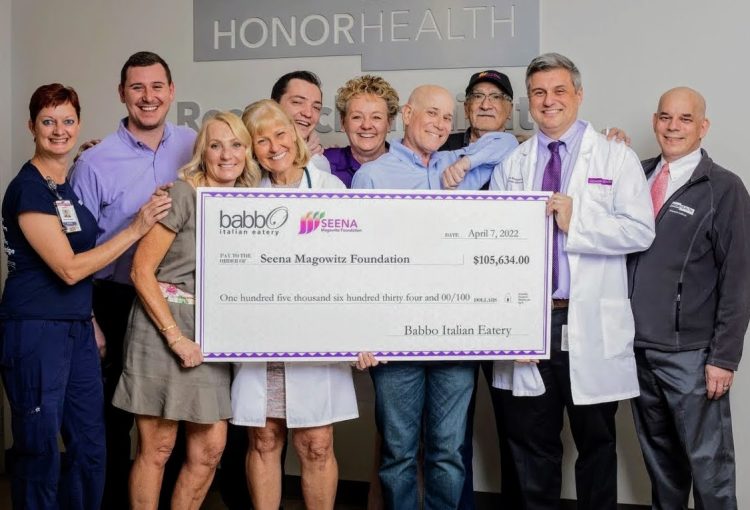
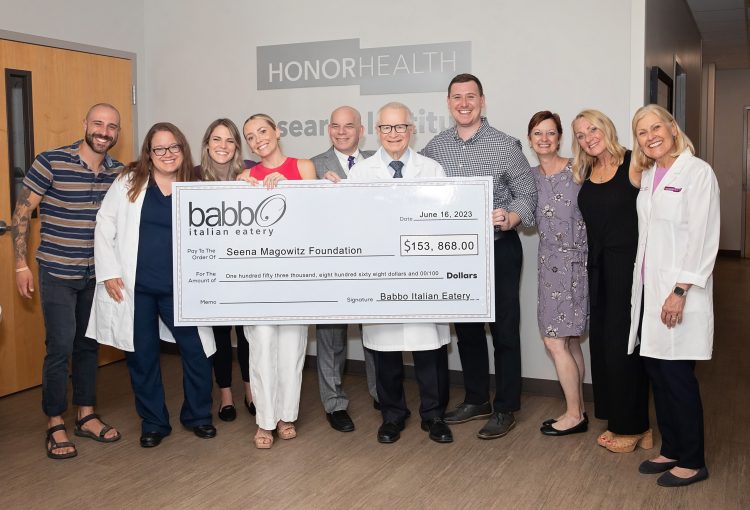
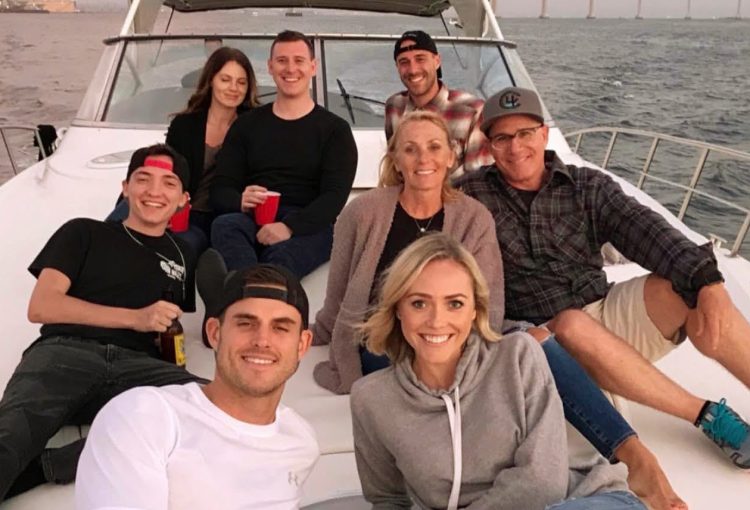

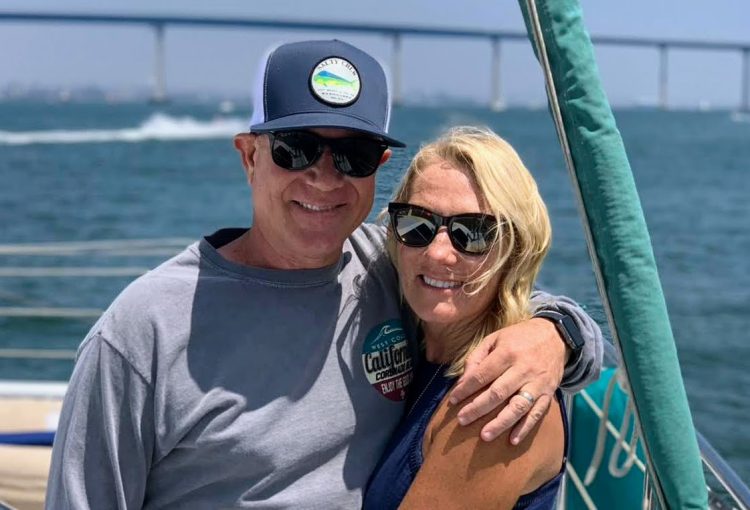
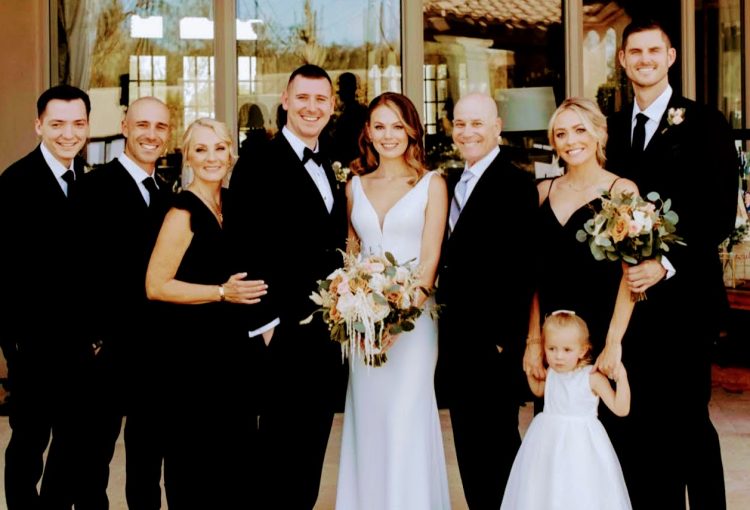
Beautiful story, beautiful family! Thanks for writing this ♥